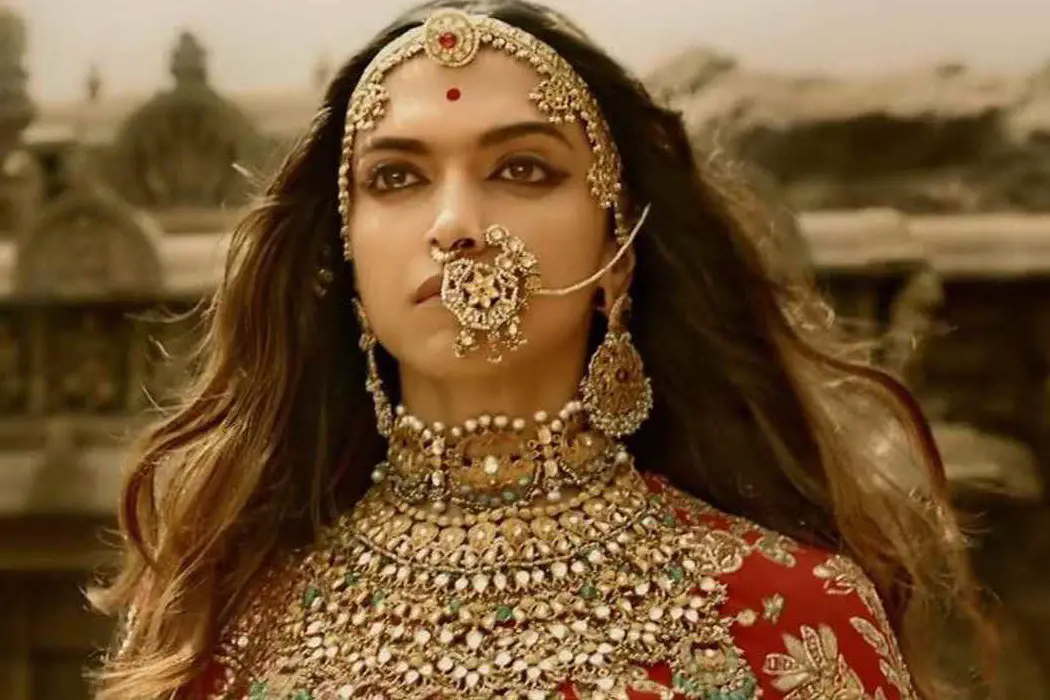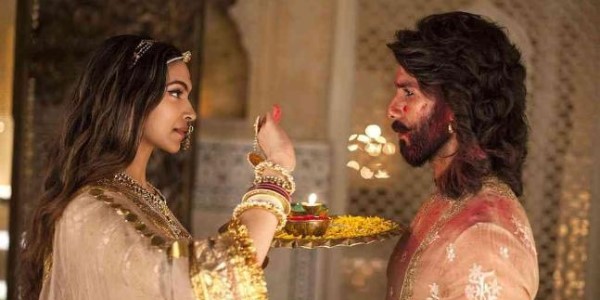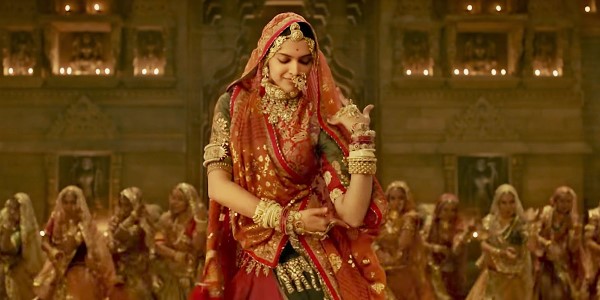PADMAAVAT: An Epic Letdown

Musanna Ahmed is a freelance film critic writing for Film…
It’s been a violently bumpy road for Padmaavat to reach audiences, taking the crown for most expensive Hindi production ever made in the process. Originally set for a theatrical release in early December, the Bollywood epic got pushed back almost two months after tumultuous responses from various groups in India who objected against its content.
Historically inaccurate
Taking place in 13th century India and based on a 16th century poem by Sufi poet Malik Muhammad Jayasi, Padmaavat is the tale of three people: Alauddin Khilji (Ranveer Singh), the Khilji ruler of the Delhi Sultanate; Ratan Singh (Shahid Kapoor), the Rajput ruler of the kingdom of Mewar; and Queen Padmavati (Deepika Padukone), a fellow Rajput who weds Ratan and is lusted after by Alauddin. The message, normally reserved for the end-credits, of how it’s a work of fiction, there’s no inference of historical accuracy, no offence to groups is intended, etc. precedes the film instead to warn right-wing groups, historians – and, especially, right-wing historians – right from the start.

Karni Sena, a Rajput organisation, plus other right-wing groups reportedly burnt posters, threatened to chop off Padukone’s nose, set vehicles alight, and attacked director Sanjay Leela Bhansali on set, due to their belief of incorrect character representations. One scene that was perceived to be in the film was an intimate one involving Alauddin dreaming of romancing Padmavati. I can confirm that no such scene exists in the final cut.
To a much more positive reception, Bhansali previously made a period piece about a royal romance situated in the middle of war, featuring a similar cast too. That film was the splendid Bajirao Mastani. Bajirao Mastani was epic in both senses of the word. It had a visual grandeur, memorable music, and top-drawer performances, with Bhansali revelling in the maximalism aesthetic achieved with shrewd use of a huge budget. Armed with a set of similar elements, Padmaavat sets out to be a similarly high quality piece of entertainment. It falls short.
Thinly drawn characters
Principally, it’s because of the seriously problematic characterizations. They’re the primary reason for the controversies and will undoubtedly be the primary reason for negative criticisms. The presentation of the Khilji and Rajput rulers is completely black and white. Alauddin is nothing but villainous – warmonger, rapist, literal backstabber – whereas Ranat is an enlightened, tolerant pacifist in comparison. But credit where credit is due, Shahid Kapoor and Ranveer Singh overpower the deficiencies in character depth through highly committed performances.

The troubling aspect is how the behaviours of the two chiefs are repeatedly emphasised to be representative of the values of the Rajput’s and Khilji’s as a whole. Both sides tell each other and themselves that “We’re Rajput/Khilji, this is how we do things”, or, “You’re Rajput/Khilji, this is how you do things?” That’s where the potential of offence is, or at the very least, a cringe-worthy view of history even in a movie that sets out to be deliberately inaccurate. There’s very little nuance in the two groups, instead Bhansali has illustrated their conflict by rendering them as simplistic binary opposites.
The Khilji’s draw the short end of the stick with a fiercely negative portrayal but somehow, the women have it worse. Bajirao Mastani also shared an atavistic backdrop but was progressive in its depiction of female characters. Padmaavati, on the other hand and despite the title, is patriarchal and parochial. Padmavati is sidelined for an unforgivably large portion of the film in favour of the clash of the male egos. Alauddin’s wife Mehrunissa (Aditi Rao Hydari) is a near-mute, eyes always filled with tears, who exists as a source of frustration for her husband’s lust for another.
Where the film works…
The two leading ladies are undoubtedly important to the story but the focus is on the two men. It’s a game of chess between them, which gets tedious during a dreary first half, until they finally convene and actually play chess. “Now the king is in danger”, Alauddin tells Ranat after making his final move during the pivotal meeting. There’s no subtlety in Padmaavat. But in a maximalist work, there’s just no room for subtlety and that’s where Bhansali thrives in his movie-making magic.

Like Bajirao Mastani, Padmaavat is a visually opulent delight. Sumptuous as can be, each frame has a display of outstanding colour, perfect lighting and a Wes Anderson-level of attention in the symmetry. It’s a gorgeous film to look at and also to listen to. The music is, again, on point with a few outstanding dance numbers including one where Alauddin hammers you over the head with his feelings, belting out, “Ever since I’ve been consumed by love, my heart is aloof from this world.” Anyone curious to see the flick should see it on the biggest screen possible.
In addition to the zesty photography and sound is a handful of awesome action sequences, particularly a sword-and-shield fight in the climax. It all contributes to the fantastical affair that Padmaavat ultimately ends up as. Fantasy fans are welcome. Historians should stay away. Though everyone may end up unsatisfied when the film concludes with a severely disconcerting resolution, that fuels Padmaavat’s fire of unambiguous, and sometimes wrongheaded, ideologies for one last time.
Padmaavat: Conclusion
In his misguided attempt to replicate the success of Bajirao Mastani, Sanjay Leela Bhansali learns that you can get struck by lightning if you try to capture it in a bottle twice.
Do you think Padmaavat lived up to its potential? Let us know in the comments below!
Padmaavatwas released in the USA and UK on January 26, 2018. For all international release dates, see here.
https://www.youtube.com/watch?v=8YaF2m7hCx0
Does content like this matter to you?
Become a Member and support film journalism. Unlock access to all of Film Inquiry`s great articles. Join a community of like-minded readers who are passionate about cinema - get access to our private members Network, give back to independent filmmakers, and more.
Musanna Ahmed is a freelance film critic writing for Film Inquiry, The Movie Waffler and The Upcoming. His taste in film knows no boundaries.













